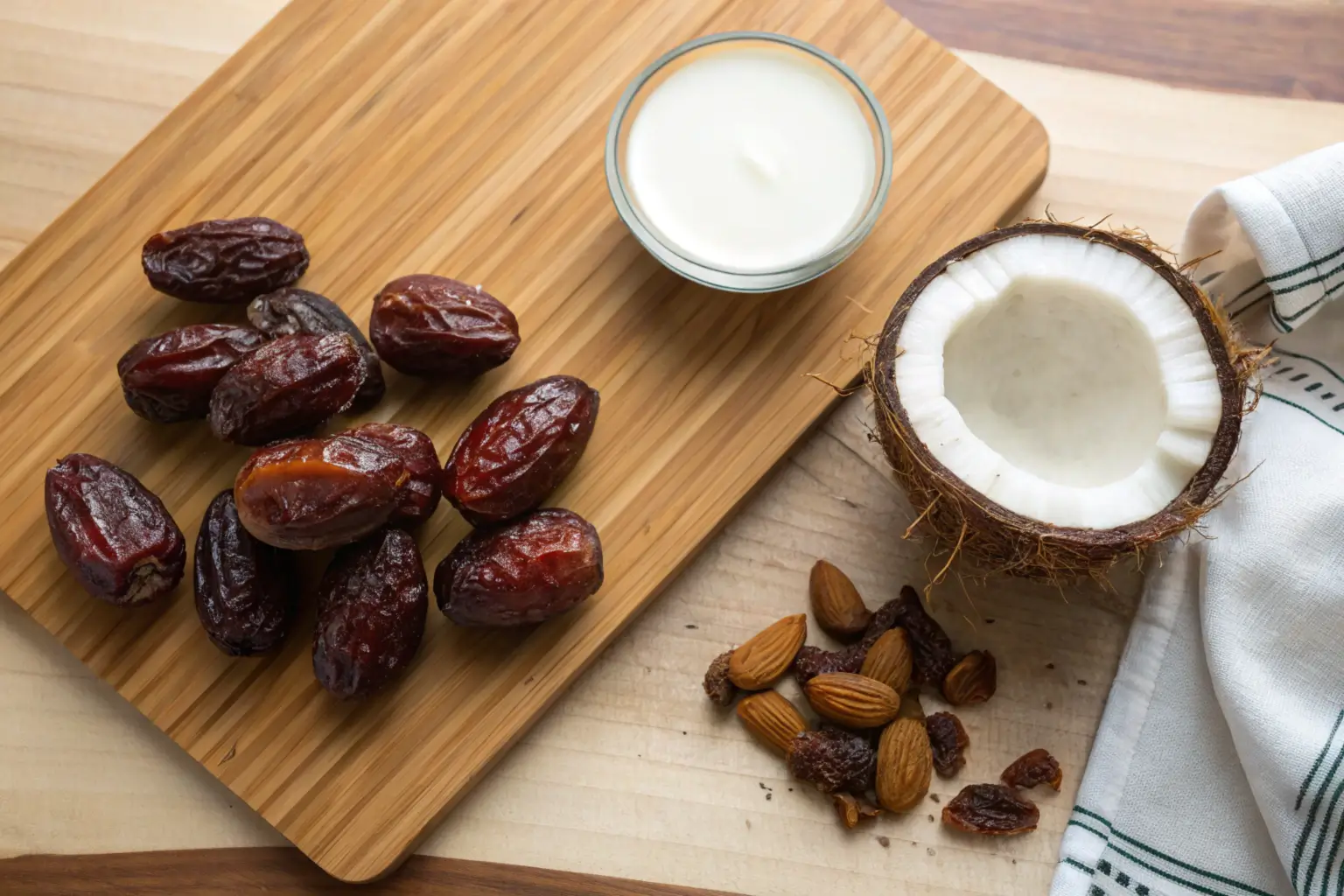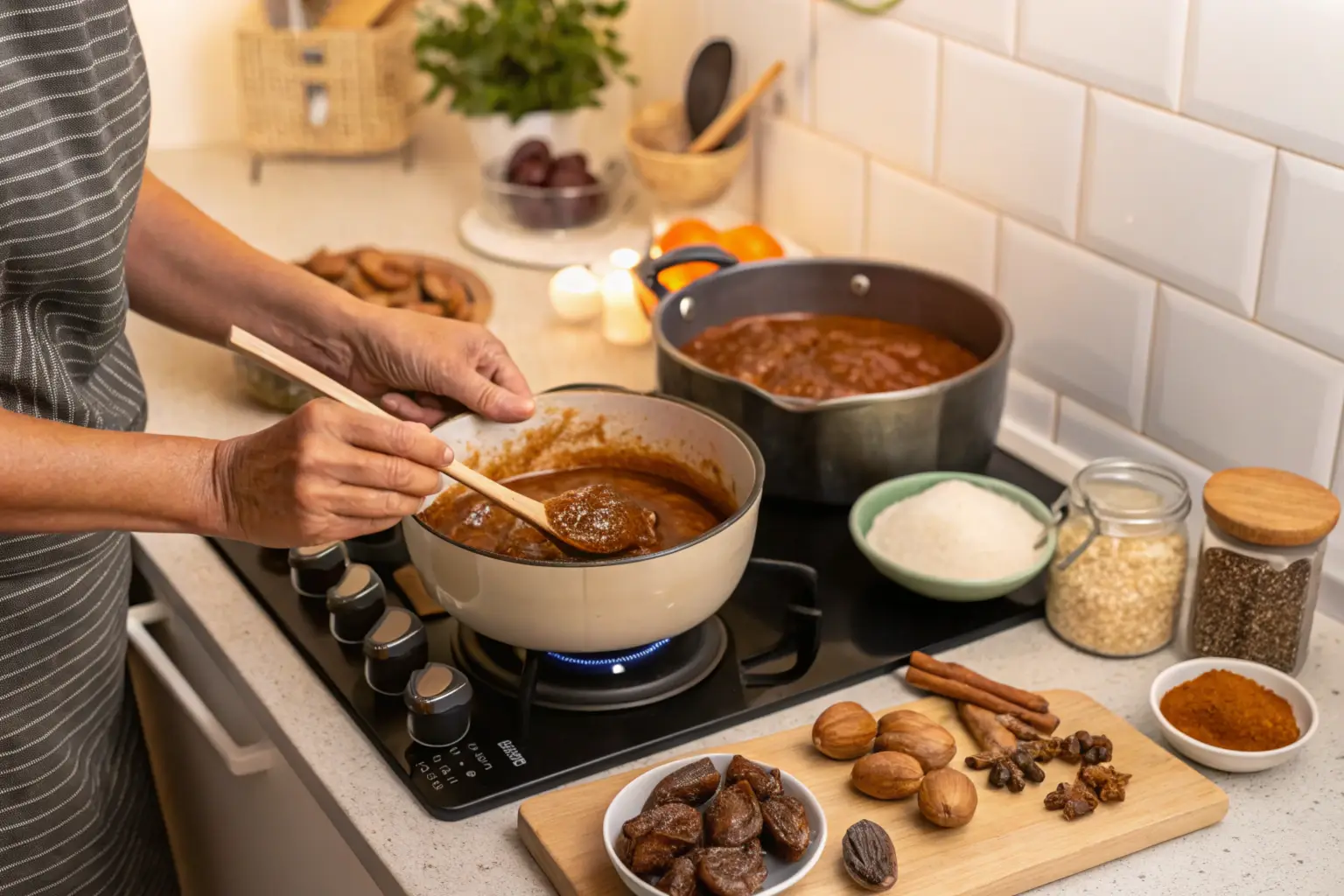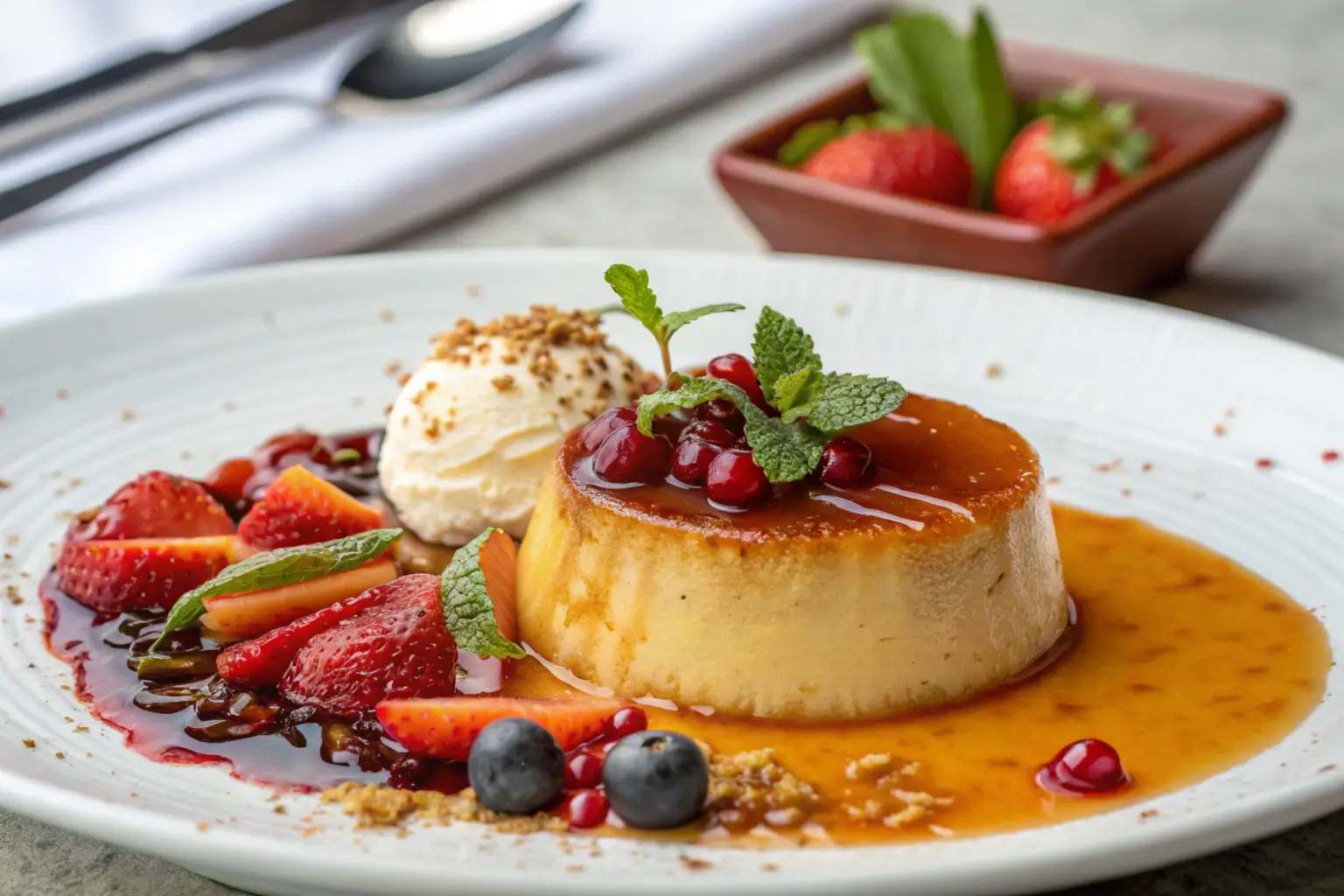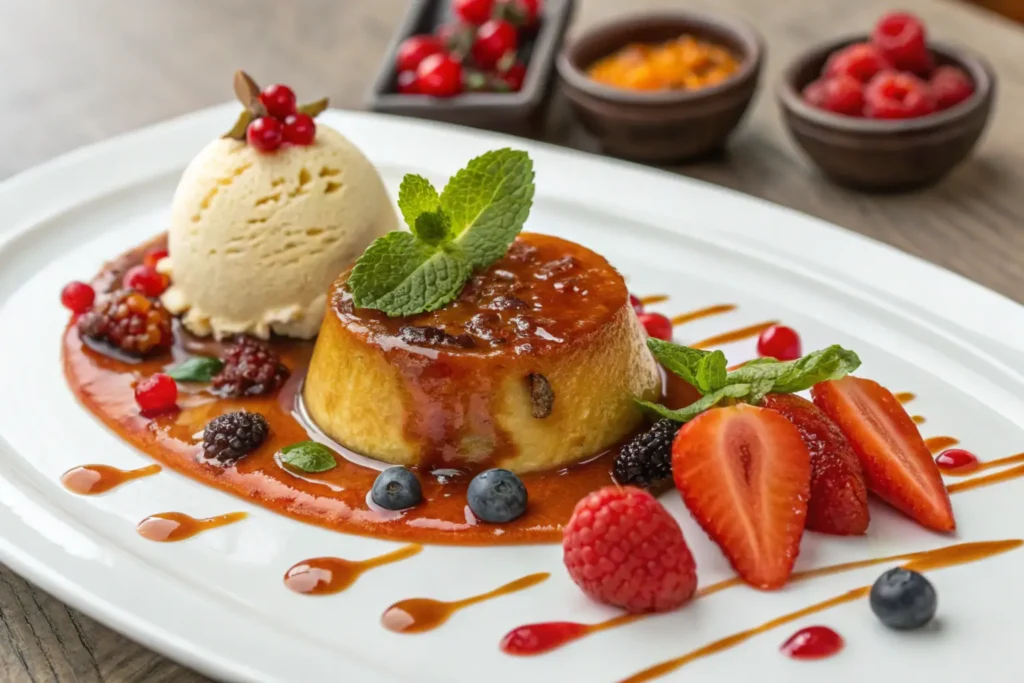Date caramel is a natural, healthier alternative to traditional caramel, but does it actually taste like caramel? While date caramel shares some similarities with its classic counterpart, such as its rich sweetness, the flavor and texture differ. Made from dates instead of refined sugars, date caramel offers a delicious, nutrient-packed option that still satisfies your caramel cravings in a more wholesome way.
Dates, especially Medjool dates, are rich in natural sugars like glucose, fructose, and sucrose, which give date caramel its sweet, rich flavor. These sugars, combined with the high fiber content of dates, contribute to a lower glycemic index, making date caramel a better option for those seeking to maintain stable blood sugar levels.
Table of Contents
When blended with ingredients like water, coconut milk, or almond milk, date caramel takes on a smooth, thick, and spreadable consistency similar to traditional caramel. It’s often used as a guilt-free topping for desserts, a spread on toast, or a sweetener in smoothies.
Key Ingredients:
- Dates: The star ingredient, providing natural sugars and a rich flavor.
- Water or Plant-Based Milk: Used to achieve a smooth consistency.
- Vanilla Extract (Optional): Adds depth and complexity to the flavor.
- Sea Salt (Optional): Enhances the caramel-like flavor profile.
Does Date Caramel Taste Like Traditional Caramel?
When we ask, “Does date caramel actually taste like caramel?” the answer lies in the subtle differences between the two. Date caramel can mimic the rich sweetness of traditional caramel, but there are noticeable flavor differences.

1. Sweetness Profile
- Traditional Caramel: Made with refined sugar, butter, and cream, it has a buttery, toasty sweetness with a slightly bitter note from the caramelization of sugar.
- Date Caramel: Derived from dates, it has a fruitier, molasses-like sweetness, with a hint of natural honey-like richness.
2. Texture
- Traditional Caramel: It is often sticky and gooey, especially when hot. It also hardens when cooled, forming a firm structure.
- Date Caramel: It has a smooth, spreadable consistency that remains soft even after refrigerating, making it more versatile for various uses.
3. Flavor Complexity
- Traditional Caramel: The flavor is more complex, with distinct butter and cream notes, and can also have a slightly burnt undertone.
- Date Caramel: While sweet, it lacks the buttery richness of traditional caramel but makes up for it with a natural, slightly earthy flavor that some find more appealing.
Quick Comparison Table:
| Aspect | Traditional Caramel | Date Caramel |
|---|---|---|
| Sweetness Profile | Buttery, toasty sweetness, slightly bitter | Fruity, molasses-like sweetness |
| Texture | Gooey, sticky, hardens when cooled | Smooth, spreadable, remains soft |
| Flavor Complexity | Rich, creamy, with a slight burnt note | Natural, earthy sweetness |
| Health Benefits | High in refined sugars, empty calories | High in fiber, potassium, and magnesium |
Health Benefits of Date Caramel
One of the main reasons people turn to date caramel is for its health benefits. Here’s a breakdown of why date caramel is a better option compared to traditional caramel:
1. High in Fiber
Fiber helps regulate bowel movements, reduces the risk of heart disease, and stabilizes blood sugar levels. Traditional caramel, on the other hand, lacks fiber and can cause rapid sugar spikes.
2. Packed with Nutrients
Dates are nutrient-dense, providing a wide array of essential vitamins and minerals, including:
- Potassium: Vital for heart and muscle function.
- Magnesium: Supports bone health and helps regulate blood sugar.
- Vitamin B6: Important for brain health and mood regulation.
3. Lower Glycemic Index
Unlike traditional caramel, which has a high glycemic index (GI), date caramel has a lower GI, meaning it doesn’t cause sharp spikes in blood sugar levels. This makes it a safer option for individuals with diabetes or those on a low-carb diet.
4. No Refined Sugars
Date caramel is free from refined sugars, making it a cleaner option for those looking to reduce their intake of artificial sweeteners and processed foods. It is also vegan, dairy-free, and gluten-free, which makes it suitable for a wide range of dietary restrictions.
5. Natural Energy Boost
Due to the natural sugars in dates, date caramel provides a steady energy boost without the crash that often follows refined sugar consumption.
How to Make Date Caramel
Making your own date caramel at home is surprisingly easy, and it only takes a few simple ingredients. Here’s a step-by-step guide:

Ingredients:
- 1 ½ cups of Medjool dates (pitted)
- ¼ cup of water (or coconut milk for a creamier texture)
- 1 tsp of vanilla extract (optional)
- A pinch of sea salt (optional)
Instructions:
- Soak the Dates:
Begin by soaking your dates in warm water for about 10-15 minutes. - Blend the Dates:
Once the dates are softened, place them in a high-speed blender or food processor. Add water or coconut milk to the mix and blend until smooth and creamy. You may need to scrape down the sides to ensure everything is fully blended. - Adjust Consistency:
If the mixture is too thick, add a little more water or coconut milk until you reach your desired consistency. The caramel should be smooth and pourable, not too runny or too thick. - Add Flavor:
If desired, add a teaspoon of vanilla extract and a pinch of sea salt to enhance the flavor. The salt can help mimic the savory notes of traditional caramel, while the vanilla extract adds depth to the overall taste. - Store:
It should last for up to two weeks.
Storage Tips:
- Store date caramel in an airtight container in the fridge.
- If it hardens, simply stir in a little water to soften it back up.
How to Use Date Caramel
Date caramel can be used in a variety of ways to sweeten your dishes naturally :

1. Spread on Toast or Pancakes
Swap your regular jam or honey for date caramel on your morning toast or pancakes for a nutritious, sweet start to the day.
2. Drizzle Over Desserts
Date caramel makes a great topping for cakes, cupcakes, and ice cream. It adds a rich sweetness to any dessert without the guilt of traditional caramel.
3. Add to Smoothies
Stir a spoonful of date caramel into your favorite smoothie for an extra burst of sweetness without refined sugars.
4. Use as a Dip
Pair date caramel with fresh fruits, like apples or bananas, for a healthy snack or dessert option.
Frequently Asked Questions (FAQ)
1. Can Date Caramel Replace Traditional Caramel in All Recipes?
Yes, date caramel can be used as a substitute for traditional caramel in most recipes. It works great as a topping for desserts, a spread, or a sweetener for smoothies and baked goods.
2. How Long Does Homemade Date Caramel Last?
Homemade date caramel can be stored in the fridge for up to two weeks. Ensure it’s in an airtight container to maintain freshness.
3. Is Date Caramel Suitable for Vegan and Gluten-Free Diets?
Yes, date caramel is vegan, dairy-free, and gluten-free, making it a suitable choice for those with dietary restrictions.
conclusion
In conclusion, date caramel is an incredibly versatile and healthier alternative to traditional caramel. It provides a sweet, rich flavor with the added benefits of natural sugars, fiber, and essential nutrients. While it doesn’t taste exactly like traditional caramel, it offers its own unique flavor profile that is equally satisfying.
Whether you’re looking to improve your diet, reduce sugar intake, or simply try something new, date caramel is a delicious and nutritious option to consider.
For more tips on enhancing your baking skills, check out How to Make Your Cookies Fluffier Instead of Flat.

